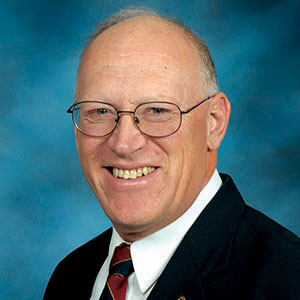Kansas Profile – Now That’s Rural: Harvey King Knives
May 25, 2022
By Ron Wilson, director of the Huck Boyd National Institute for Rural Development at Kansas State University
Let’s go to Atlanta, to the largest blade and knife show in the world. Among the exhibitors is a craftsman from halfway across the continent. He is displaying his high quality knives that are handmade in rural Kansas.
![]() Harvey King is the craftsman who started his own business, known as Harvey King Knives. Harvey is a native of Topeka. After college, he met and married Bonnie who was from Eskridge. They moved to Eskridge and lived there for 34 years. In 2004, he and Bonnie noticed a place that they admired in the country near Alta Vista, and eventually moved to where they live today.
Harvey King is the craftsman who started his own business, known as Harvey King Knives. Harvey is a native of Topeka. After college, he met and married Bonnie who was from Eskridge. They moved to Eskridge and lived there for 34 years. In 2004, he and Bonnie noticed a place that they admired in the country near Alta Vista, and eventually moved to where they live today.
At right: Harvey King
“I have been interested in knives most of my life,” King said. “My dad was an avid outdoorsman. He loved to hunt and fish, and he taught me the value of a good knife at a young age.”
“I spent 31 years building earthmover tires at Goodyear in Topeka,” said King, who is now retired. “The maintenance men at Goodyear knew I liked to hunt and fish and trap. They showed me some of the knives that they made in their spare time and, pretty quick, I wanted to try it.”
He started making knives in 1988 and soon found other people wanted them. A taxidermist friend talked him into sharing a table at some of the local shows and Harvey’s knives sold well. He launched his own business, Harvey King Knives, and started selling them at knife and gun shows around the country. In July 2022, King will turn 75.
“My daughter asked when I would retire,” King said. “I told her, when it ceases to be fun or when I’m too shaky to do it right. (Right now), it’s still fun.”
Hunters have an old saying: The gun does the work for 30 seconds, but the knife does the work for 2-3 hours. In other words, a hunting knife is used extensively, so it is important to have a good one.
What are the keys to making a good knife? ”Fit and finish,” King said. “The parts need to fit together just right, with no gaps, voids or holes, and the finish grind lines need to be straight.”
It is also important to start with the right materials, he said.
“A good knife starts with a properly heat-treated quality steel blade,” King said. He makes his blades out of D2 tool steel in 1/8” or 5/32” thickness. “It holds a good edge.”
What about the knife handle? “I like natural handles,” he said. King constructs his handles out of California buckeye, Amboyna Burl (a wood from southeast Asia), boxelder and hedge. The wood is injected with polyurethane carbonate to stabilize it. “It polishes out great,” King said.
He also handcrafts a leather sheath that goes with each knife. King creates various models of knives for small game, hunting, personal, companion use and more.
King has a supply of knives for sale and also makes custom knives on demand. In a year, he might produce as many as 175 knives. He is a member of the Professional Knifemakers Association, the American Bladesmith Society, and a past voting member of the Knifemakers Guild.
“I go to gun and knife shows,” he said, at one point attending 26 a year. He used to go to the Blade Show in Atlanta, which is the largest knife show in the world, but he prefers the shows in Denver and in Ohio, which are more personal. His knives have gone from coast to coast, from California to New York.
It's an impressive record for a craftsman located near the rural community of Alta Vista, population 409 people. Now, that’s rural.
For more information, go to www.harveykingknives.com.
It’s time to leave the world’s largest knife show, where Harvey King is displaying his beautiful knives that were handcrafted in rural Kansas. We salute Harvey King for making a difference with his skills and craftmanship. You might say they are cutting edge.
Audio and text files of Kansas Profiles are available at http://www.kansasprofile.com. For more information about the Huck Boyd Institute, interested persons can visit http://www.huckboydinstitute.org.
***
The mission of the Huck Boyd National Institute for Rural Development is to enhance rural development by helping rural people help themselves. The Kansas Profile radio series and columns are produced with assistance from the K-State Research and Extension Department of Communications News Media Services unit. A photo of Ron Wilson is available at http://www.ksre.ksu.edu/news/sty/RonWilson.htm. Audio and text files of Kansas Profiles are available at http://www.kansasprofile.com. For more information about the Huck Boyd Institute, interested persons can visit http://www.huckboydinstitute.org.


